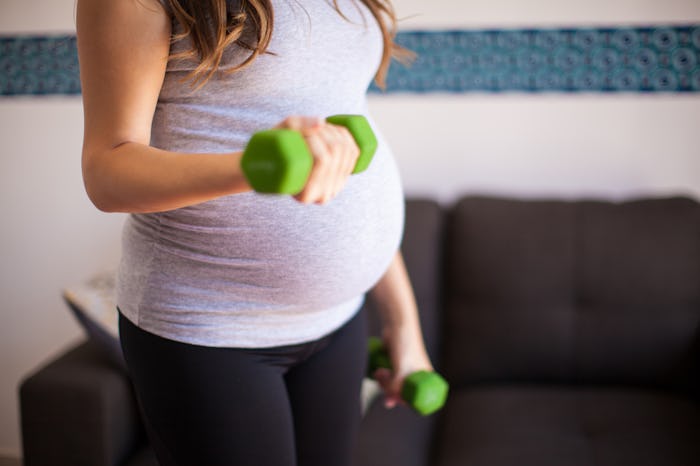Life

What You Need To Know About Using Beachbody While Pregnant, According To Experts
You might have noticed your Facebook and Instagram feeds blowing up with videos of your friends mid-workout and the before and after photos of their bodies. Most of the programs being used by your pals are probably some form of Beachbody fitness, which have become popular lately due to the mid-level marketing (MLM) system by which they're sold. But because sellers of Beachbody don't necessarily need any training to do so, it can be hard to tell if these programs are safe for every person in every condition. For instance, can you use Beachbody programs when pregnant?
Beachbody has a large line of workout/nutrition programs, but the most popular seem to be Insanity, 21 Day Fix, and P90X. The basis of all three of these programs, though they offer a variety of daily workouts, is pushing the maximum high-intensity trainings through intervals or body-focused daily routines, in order to burn the most fat and calories in a short period of time (typically 30 minutes a day, with length of programs ranging from 21 days to 90 days).
"Overall, these sort of health and fitness programs are designed around a 'quick fix,'” says Registered Dietitian Sebastian Zorn, based in Chicago. "They are meant to use extreme methods to achieve a drastic calorie deficit, whereby the individual loses weight quickly."
We know that crash dieting, or diving into intense exercise after being largely sedentary, is not the healthiest way to reach our goals, Zorn explains to Romper. "Having too high of a calorie surplus can make us feel like crap, rob us of our energy, and cause us to lose lean body mass if sustained long enough. These programs often encourage those bad habits and a short-term mindset, which is why I typically do not recommend them."
This all becomes more relevant when you are pregnant, Zorn notes. "When you are pregnant, it is even more important that you get enough calories, because you are growing another human inside of you! It’s one of the worst times to be in calorie deficit by not eating enough, or exercising too intensely."
Dr. Lakeisha Richardson, OB-GYN, agrees, telling Romper, "Staying healthy and maintaining an ideal weight during pregnancy is every physician's goal for their patient. However, safety has to come first."
Pregnant women who were exercising on a regular basis prior to pregnancy should definitely continue to work out during pregnancy, Richardson adds. Women who wish to start exercising during pregnancy, however, should begin with a light-intensity exercise routine for five to 10 minutes per day, and build up slowly, but refrain from surpassing the moderate stage.
"Extreme routines such as Insanity, P90X, or 21 Day Fix are typically too extreme for pregnancy," says Richardson. "High-intensity workouts increase the risk for falls during pregnancy due to the growing abdomen and the change in the center of gravity. Maximum-intensity workouts can cause a significant increase in oxygen consumption and heart rate, which can increase the risk of dizziness, shortness of breath, and syncopal episodes," all of which you'd like to avoid during pregnancy.
Beachbody has recently come out with a pregnancy-geared workout, and offers "modifiers" during some of their other workouts, but the larger issue comes when untrained health coaches (typically, coaches/sellers of Beachbody are accepted on an open-door approach, without extensive health or fitness training) make recommendations or consult users. Potential health hazards can be easily overlooked.
Ideally, people, and especially pregnant women, should be consulting a credentialed health professional for advice on exercise and nutrition regimens. When it comes to pregnancy, it never hurts to be a little extra cautious. If you want to try any Beachbody programs, talk to your doctor about the ones that are best for you and your baby.